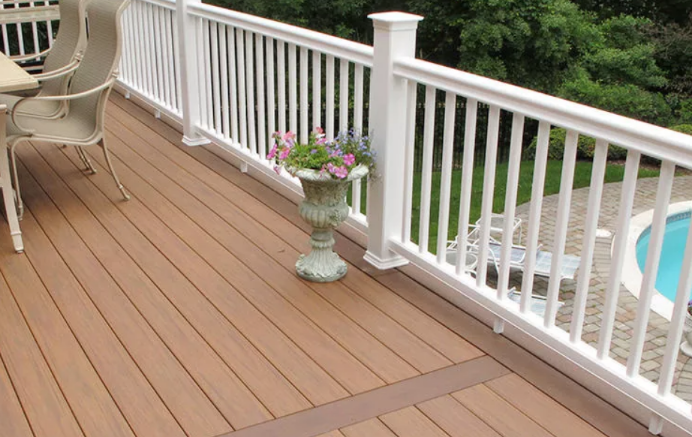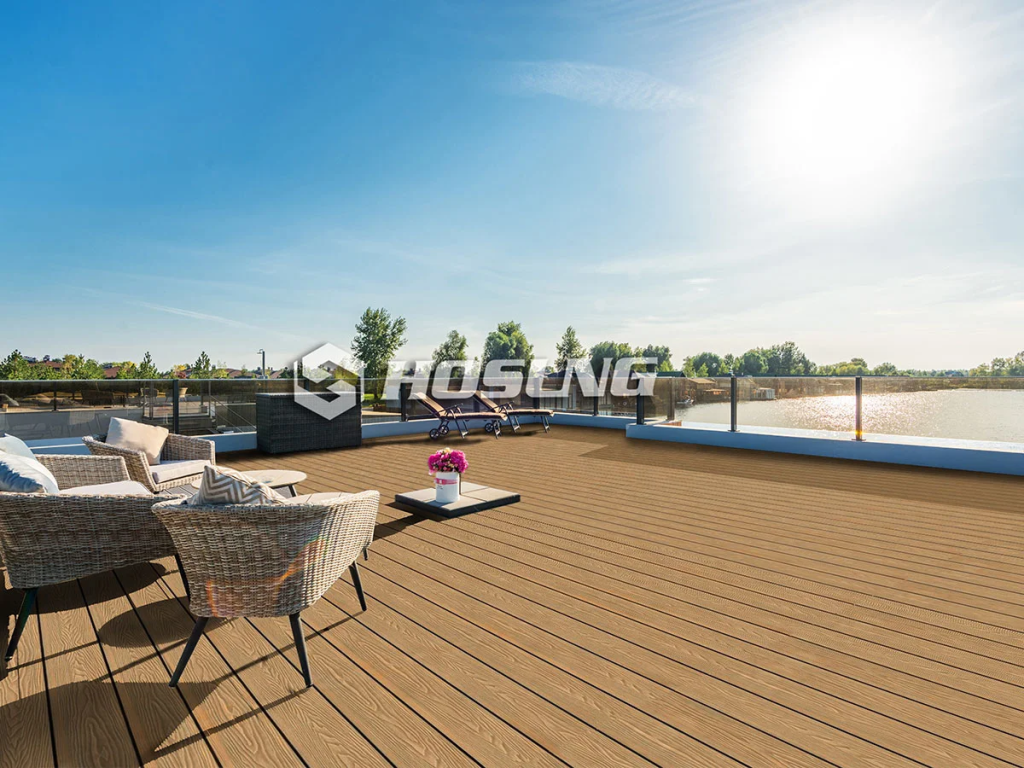When Canadian homeowners start planning a new deck, colour becomes one of the most exciting — and challenging — decisions to make. Climate, regional landscapes, architectural styles, and personal taste all influence which hues look best in different provinces. With modern manufacturing offering dozens of tones ranging from weathered greys to deep espresso browns and contemporary black finishes, composite decking colours in Canada have never been more diverse.
Table of Contents
This article explores everything related to colour selection: popular shades across Canada, how temperature affects colour choices, pairing strategies with home exteriors, long-term colour performance, and trending palettes that are becoming favourites for 2025 and beyond.
In addition, composite decking often comes with a longer lifespan compared to traditional wood decking. It resists fading, cracking, and warping, which is essential in areas with harsh winters or hot summers. This makes composite decking a smart investment for homeowners seeking durability and low maintenance.
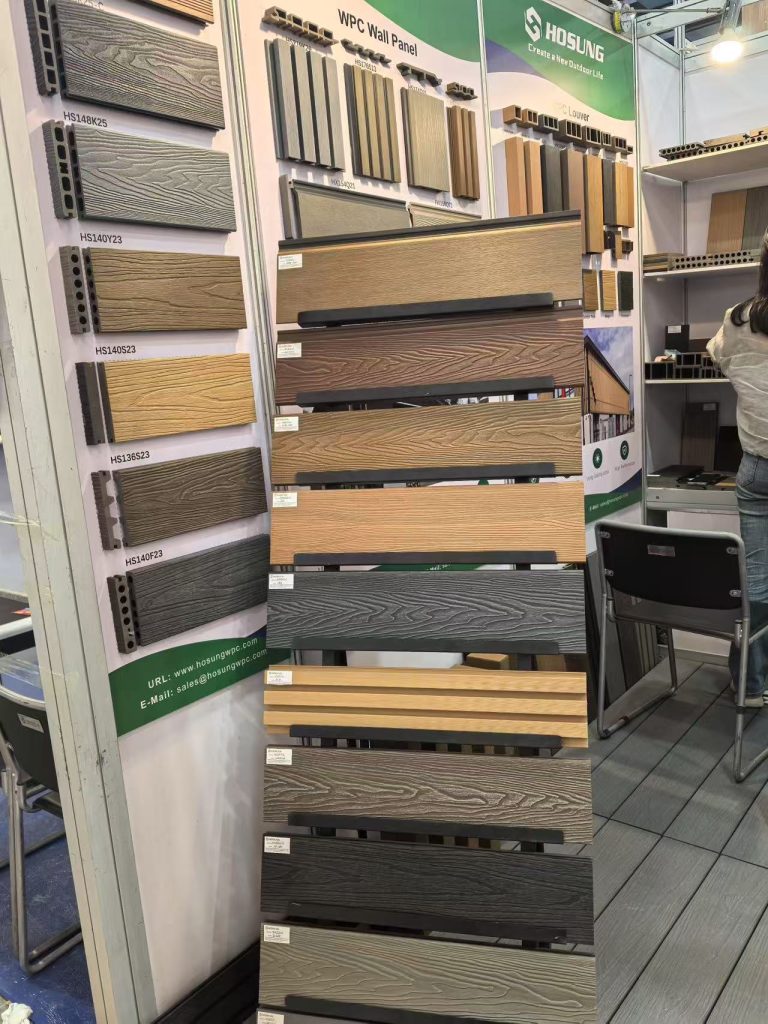
Why Colour Matters More in Canada Than Anywhere Else
Canada’s outdoor environments are unique. From snowy winters to hot summers, from coastal salt air to Prairie sun exposure, deck colours behave differently depending on location. Many homeowners discover that appearance, heat absorption, maintenance ease, and UV exposure vary dramatically among colours.
Because composite decking is designed to last decades, a colour choice today becomes a long-term visual centerpiece of the home. That’s why selecting the right shade is more than just choosing something that “looks good.” It’s about choosing a colour that enhances your home through all four Canadian seasons.
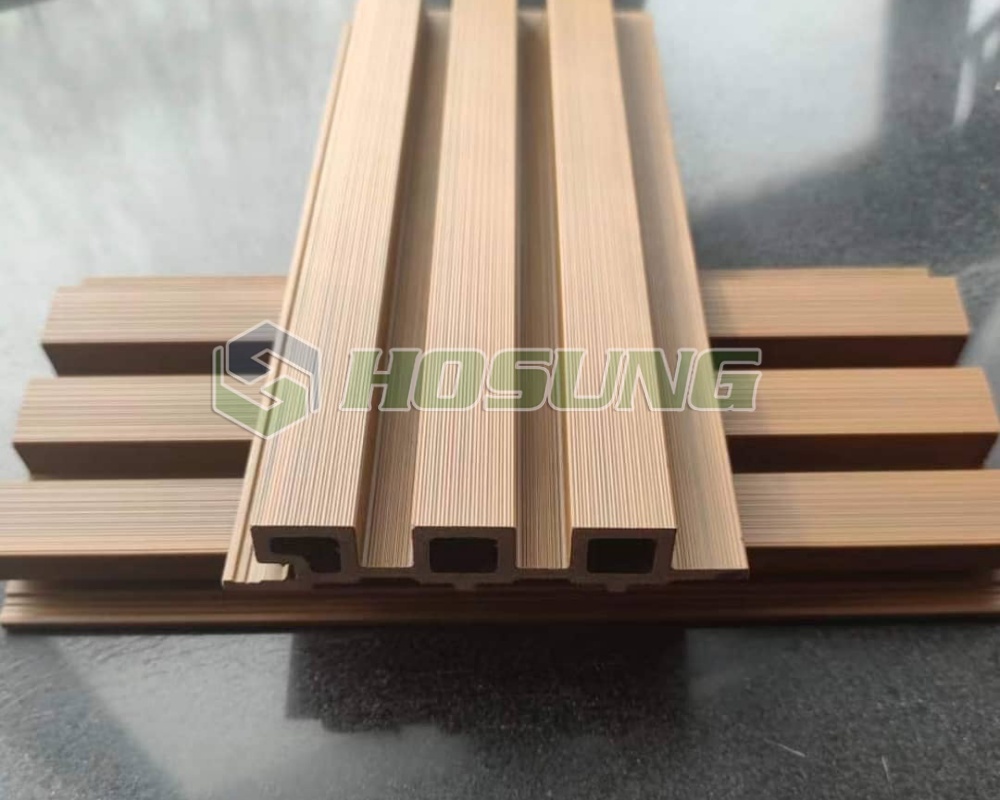
Most Popular Composite Decking Colours in Canada (Province by Province)
Different regions of Canada show surprisingly consistent colour trends. If you’re looking for inspiration, this breakdown reveals real-world preferences from coast to coast.
1.1 British Columbia: Earthy Browns and Rich Wood Tones
BC homeowners prefer colours that blend into natural surroundings:
Cedar brown
Rustic walnut
Golden teak
Redwood-styled chestnut
The abundance of forests, mountains, and cedar homes makes warm tones complement both modern and traditional architecture. Deep browns also look cleaner in rainy climates, hiding water spots and debris better than greys.
1.2 Alberta: Mid-Greys and Weathered Tones
Alberta sees long hours of sunlight and extreme temperature swings. This has led to a preference for:
Weathered grey
Stone grey
Smoky silver
Light ash
Greys offer a modern, crisp look that pairs well with stucco homes and contemporary architecture in Calgary and Edmonton. Lighter greys stay cooler under the hot Prairie sun, making them a practical option for summer comfort.
1.3 Saskatchewan and Manitoba: Lighter Browns and Cooling Neutrals
Homeowners in the Prairies often choose decking to complement neutral house exteriors. Popular colours include:
Beige-tinted browns
Sandy oak
Pale driftwood
Soft tan with grey undertones
These colours brighten large backyard spaces and blend seamlessly with minimalist exterior palettes.
1.4 Ontario: Modern Dark Tones and Dual-Colour Combinations
Ontario is the most diverse decking colour market. Homeowners often choose darker, dramatic tones such as:
Espresso brown
Charcoal black
Deep graphite
Aged maple
Multi-toned boards are also extremely popular in Toronto and Ottawa because they complement mixed-material exteriors featuring brick, metal, and wood.
1.5 Quebec: European-Inspired Greys and Rustic Browns
Quebec’s architecture has strong European influences, leading to popular shades such as:
Slate grey
Driftwood
Cappuccino brown
Warm caramel
Greys add sophistication to Quebec’s stone homes, while caramel tones match classic timber framing styles.
1.6 Atlantic Canada: Cool Greys and Ocean-Inspired Tones
The maritime climate inspires colours that match coastal surroundings:
Light coastal grey
Dove grey
Soft blue-toned greys
Weathered driftwood
Salt air and humidity make light colours a safer choice for long-term appearance, as they show less fading.
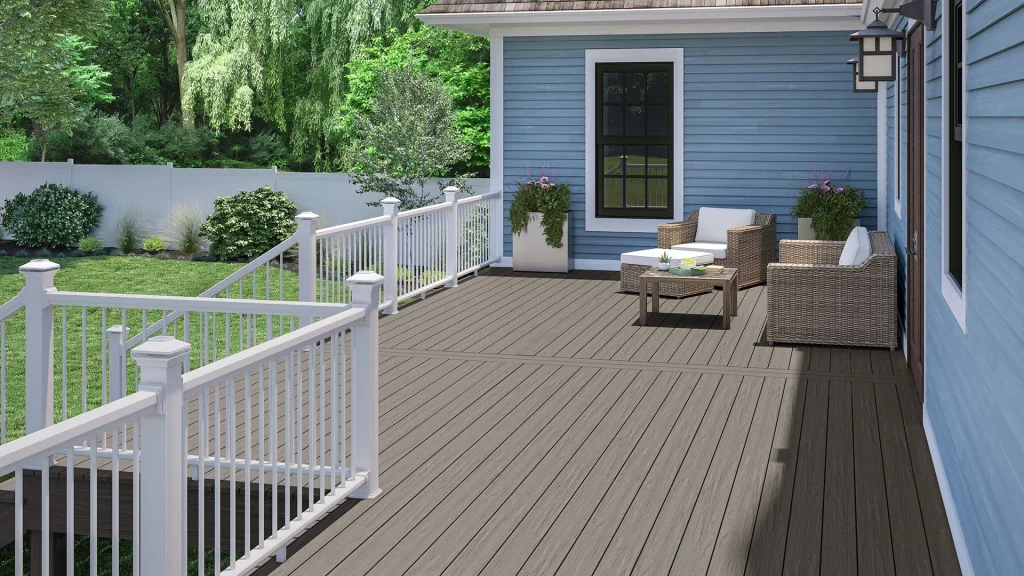
Trending Composite Decking Colours in Canada for 2025
Every year brings shifts in outdoor design, and colour trends evolve with modern architecture and landscaping styles. For 2025, several colour families are gaining momentum across Canada.
2.1 Driftwood Greys
This remains Canada’s #1 most-requested colour. Homeowners love the subtle mix of cool grey and natural wood grain. It pairs perfectly with black aluminum railings — a top trend nationwide.
2.2 Jet Black and Charcoal Black
Black decking is exploding in popularity for ultra-modern homes. Charcoal tones create a sleek, minimalist look that matches black window frames, a growing trend in new Canadian builds.
Benefits include:
striking contrast with light siding
dramatic evening ambience
perfect match with modern matte-black accessories
2.3 Multi-Tone Weathered Boards
Boards with blended streaks of:
grey + brown
tan + charcoal
walnut + gold undertones
…are climbing rapidly in popularity. Multi-tones mimic high-end hardwood aesthetics without the maintenance.
2.4 Warm Honey Browns
“Nature-inspired luxury” is a strong trend. Warm honey colours pair well with minimalist landscaping, giving a soft, inviting feel that works from Vancouver to Halifax.
2.5 Light Ash and Whitewashed Colours
A growing favourite for Scandinavian-style homes. The bright look:
makes small decks appear larger
stays cool in summer
pairs beautifully with natural stone
How to Choose the Best Composite Decking Colour for the Canadian Climate
Canada’s climate is demanding, and colour plays a big role in heat, longevity, and year-round appearance.
3.1 Hot Summers: Choose Cooler Tones
Lighter colours reflect sunlight better, keeping deck surfaces cooler. Popular cool-tone options:
light grey
pale oak
sandy tan
driftwood silver
If your deck will be used barefoot frequently, especially around pools, choose something in the lighter spectrum.
3.2 Snowy Winters: Choose Colours That Hide Ice Residue
Dark colours can reveal salt stains; very light colours can show mud. Mid-tones work best for winter-heavy regions.
Ideal shades:
medium greys
rustic brown
muted walnut
They hide dirt, slush, and footprints more effectively than extremes.
3.3 High UV Exposure: Choose Fade-Resistant Neutrals
Areas such as Alberta and Saskatchewan experience intense sunlight. Some colours fade more noticeably than others.
UV-friendly tones:
natural brown
mid grey
variegated streaked boards
walnut with grain texture
3.4 Humid or Coastal Areas: Avoid Very Dark Colours
Dark colours absorb heat and may show salt build-up. Choose:
coastal grey
pebble tan
washed brown
These keep the deck cooler and look fresher in humid environments.
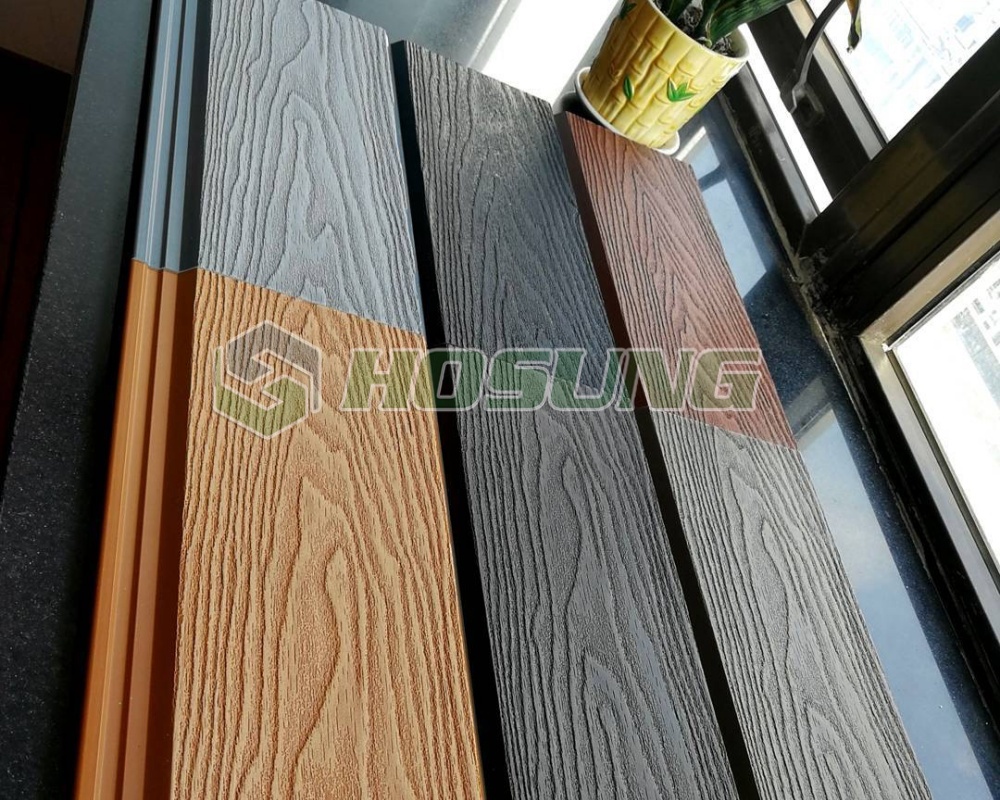
Matching Deck Colours with Canadian Home Exterior Styles
Most Canadian houses fall into several dominant styles. Below are colour recommendations that enhance each architectural type.
4.1 Brick Homes (Ontario, Quebec)
Brick exteriors pair beautifully with:
dark espresso
charcoal grey
warm chestnut
reddish-brown tones
These colours bring out the depth of the brick.
4.2 Vinyl Siding (Across Canada)
Vinyl siding often comes in light neutrals. Best matching deck colours include:
medium greys
tan
sandy brown
driftwood
These create contrast without overpowering the home.
4.3 Stone or Stucco Homes (BC, Alberta)
Stone exteriors look best with:
warm brown decking
grey + brown multi-tone
slate grey
walnut
These tones complement the earthy colours of stone.
4.4 Contemporary Black Window Frames
This modern trend calls for:
jet black
ultra dark grey
silver-grey (for contrast)
whitewashed ash
Black decks create a seamless “frame-to-floor” visual line.
4.5 Cabins and Lake Houses
Natural landscapes pair beautifully with:
cedar brown
golden teak
rustic walnut
driftwood grey
Perfect for Muskoka, the Okanagan, and Northern Quebec.
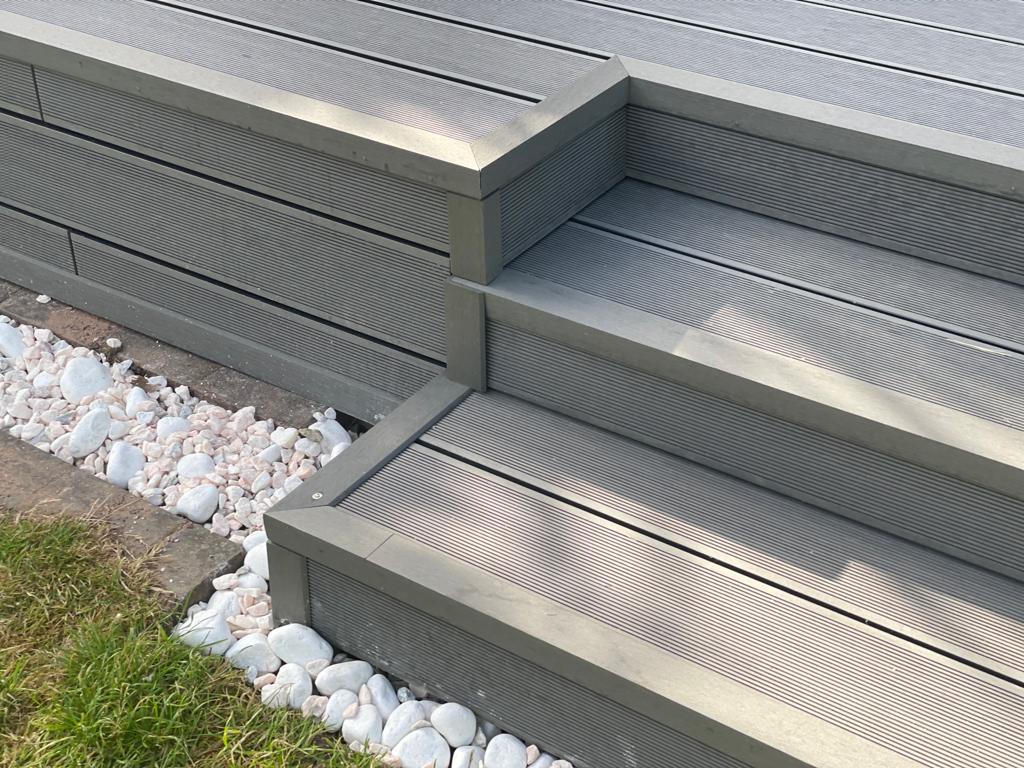
How Lighting and Surroundings Change Deck Colour Appearance
Many homeowners are shocked when a board looks different outdoors compared to in-store. That’s because sunlight direction, shade, and environmental colours affect appearance.
5.1 Daylight vs Evening Light
Daylight: makes greys look cooler and browns look lighter
Golden hour: adds warm glow to tan and honey colours
Evening: dark colours appear more dramatic and modern
Always review samples at different times of day.
5.2 Sun vs Shade
A shaded deck will make dark boards appear even darker. A fully sunlit deck makes light boards appear brighter.
Shaded decks benefit from:
warm browns
medium greys
Sunny decks benefit from:
driftwood grey
pale oak
ivory-toned decking
5.3 Landscaping Influence
Green plants make greys look bluer.
Stone pavers make browns appear richer.
Nearby water reflects light and brightens pale-coloured boards.
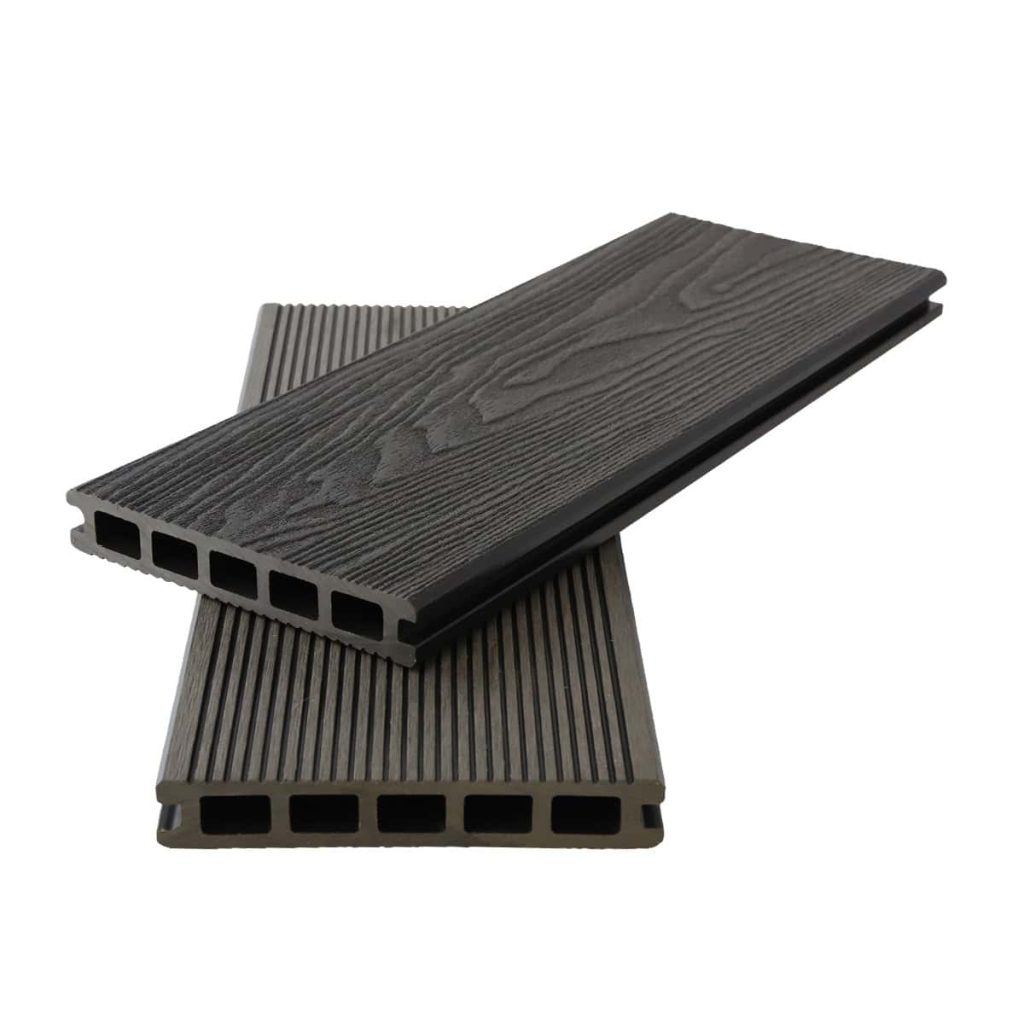
Single-Colour vs Two-Tone Deck Designs in Canada
Two-tone decks have become one of the strongest design trends.
6.1 Single-Colour Decks: Clean and Minimalist
A single colour provides:
simplified installation
cohesive appearance
minimal visual clutter
Best for small or narrow spaces.
6.2 Two-Tone Decks: Premium and Architectural
Canadians love using either:
dark border + light interior
light border + mid-tone interior
grey and brown combinations
Popular combinations:
charcoal border + driftwood grey interior
espresso border + cedar interior
black border + silver interior
Two-tone decks visually enlarge the outdoor space and create a custom, high-end effect.
Long-Term Colour Performance and Fading in Canada
Composite decking manufacturers have improved UV resistance significantly, but all outdoor materials experience minimal fading over time.
Colour fade varies depending on:
UV intensity
heat exposure
colour depth
board technology
Darker colours fade slightly more noticeably, especially in high UV locations.
Light greys and driftwood shades show the least visible fading because they already have weathered characteristics.
Choosing the Right Decking Colour Based on Use and Lifestyle
Different lifestyles, household routines, and intended uses of the outdoor space can greatly influence which decking colours will perform best, both visually and practically, over time.
8.1 For Families with Children
When you have young children at home, it is important to select decking colours that effectively conceal common messes, including dirt, food spills, and the inevitable scuff marks that appear from running and playing outdoors every day. The most practical options for busy families include mid-tone brown shades, medium grey boards that provide a neutral yet visually appealing look, or multi-tone streaked boards that naturally hide imperfections while maintaining an attractive appearance.
8.2 For Poolside Decks
For decks located near swimming pools, it is crucial to consider how different colours reflect heat, because overly dark surfaces can become uncomfortably hot in direct sunlight. Pool-friendly decking colours such as pale grey, light oak, stone beige, or whitewashed tones are excellent choices, as they remain cooler under the sun, minimize glare, and maintain a pleasant temperature for walking barefoot while complementing surrounding pool features and furniture.
8.3 For BBQ and Dining Areas
In outdoor areas dedicated to barbecues, dining, and entertaining, it is wise to choose decking colours that do not easily highlight grease stains, spills, or accidental food splatters. Shades such as walnut, medium brown, or mixed multi-tone boards provide both aesthetic appeal and practical resilience, helping to maintain a clean, welcoming appearance even after frequent outdoor meals and gatherings with family or friends.
8.4 For Pet-Friendly Homes
Homes with pets require decking colours that can conceal scratches, claw marks, and pet hair while maintaining a stylish look. Rustic brown, textured grey, and driftwood-patterned boards are excellent solutions because their natural variations and subtle patterns camouflage minor wear and tear, making them ideal for families who want to enjoy a pet-friendly outdoor space without worrying about visible damage over time.
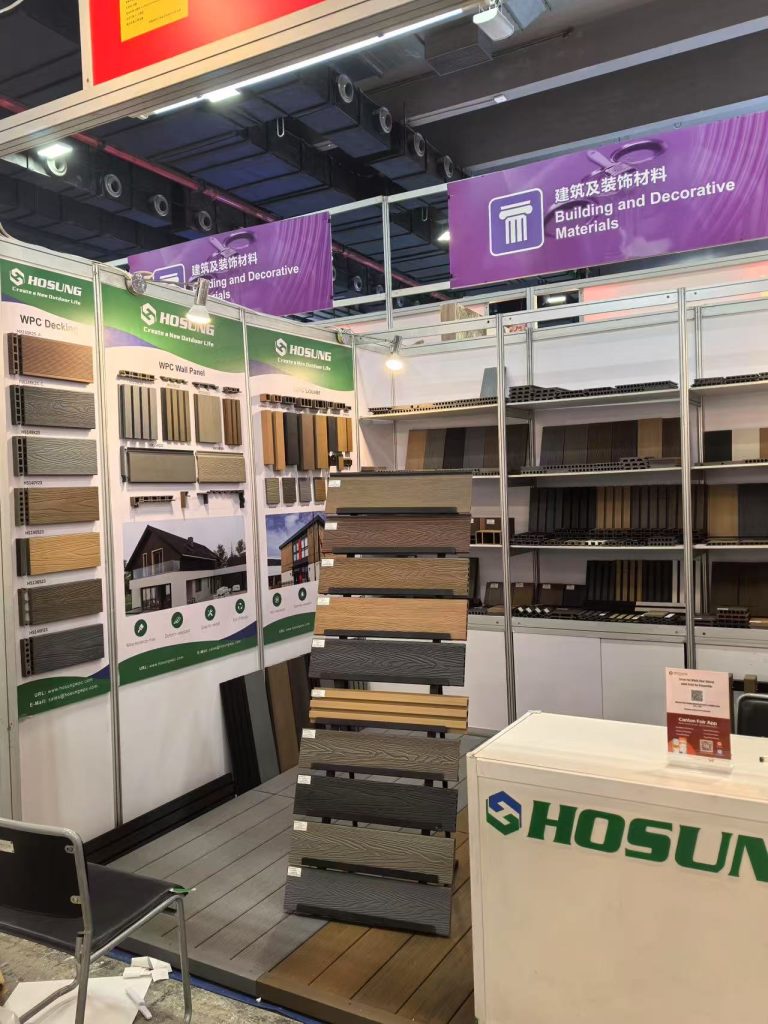
Styling Accessories: Railings, Furniture, and Decor Based on Deck Colour
Your deck colour should coordinate with accessories for a polished look.
9.1 Black Railings (Canada’s #1 Choice)
Matches perfectly with:
grey decks
driftwood
charcoal
espresso
Black creates bold contrast and frames the deck visually.
9.2 White Railings
Best with:
brown decks
tan boards
honey oak
White creates a bright, beach-style aesthetic.
9.3 Glass Railings
Great for:
coastal grey decks
driftwood
silver-grey
Glass visually expands space and complements lighter tones.
9.4 Furniture Colours to Match
Popular combos:
Grey deck + navy furniture
Brown deck + cream cushions
Black deck + wood furniture
Light deck + charcoal accents
Trending Colour Combinations Canadians Are Using in 2025
Below are real trending pairings:
10.1 Grey Deck + Black Rail + Warm Wood Furniture
A modern Canadian favourite.
10.2 Brown Deck + White Rail + Beige Decor
A timeless classic for suburban homes.
10.3 Charcoal Deck + Glass Rail + Green Plants
A clean luxury look.
10.4 Driftwood Deck + Black Frames + Steel Accents
A sophisticated minimalist style.

Conclusion: Choosing the Best Composite Decking Colours Canada Offers
Canada has one of the most diverse outdoor design markets in the world, and colour preferences vary from coast to coast. Whether you love warm browns, contemporary greys, dramatic blacks, or coastal-inspired tones, today’s composite decking options offer stunning looks with long-lasting performance. By understanding regional trends, climate factors, home styles, and lifestyle needs, you can choose a colour that elevates your outdoor living space for decades.
If you’re starting your deck project and want the perfect shade, use the insights in this guide to make an informed, confident choice — one that enhances your home through every Canadian season. Also, welcome to get more about Hosung WPC!


